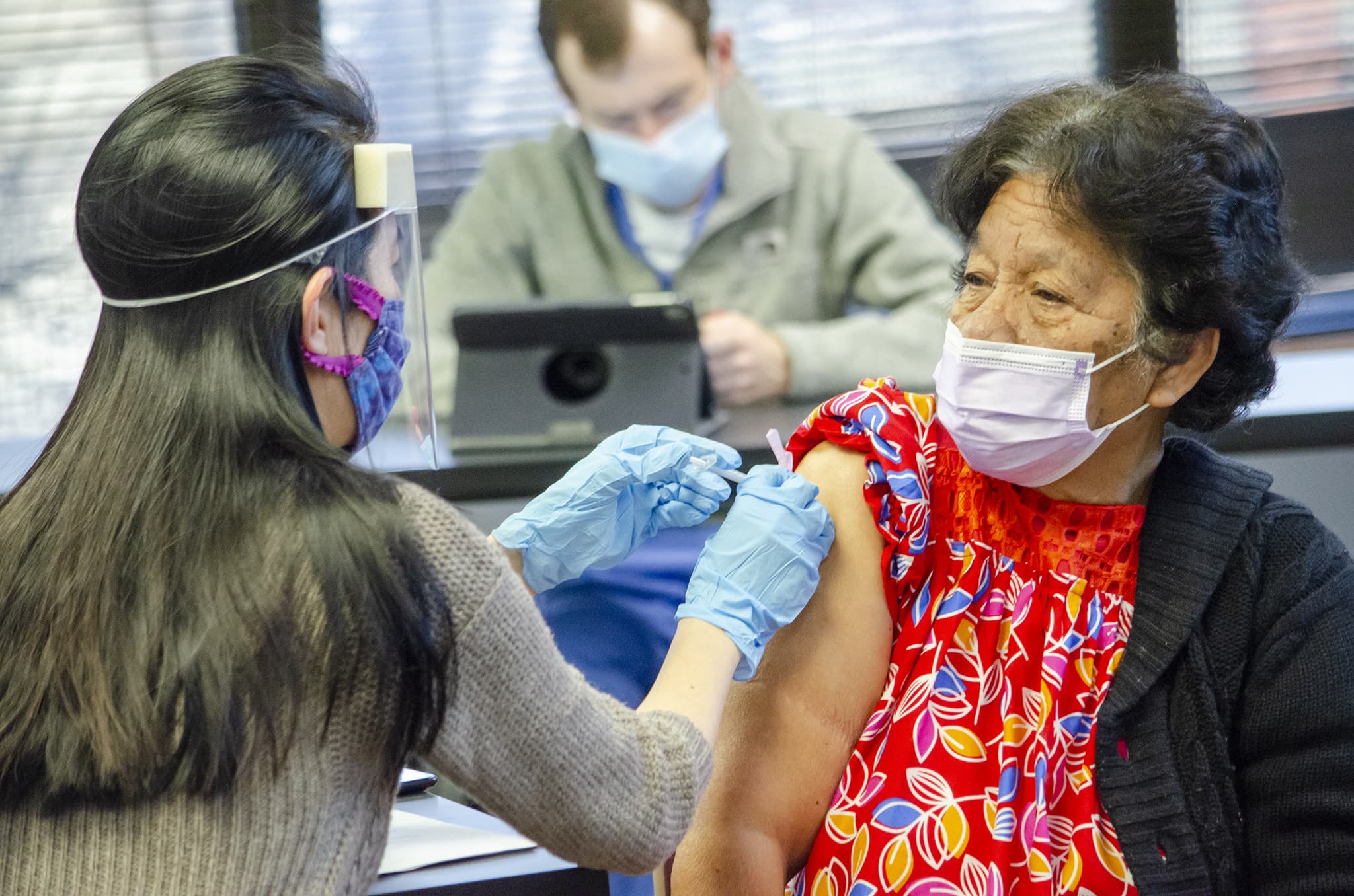View Larger Image

A Marshallese resident in Northwest Arkansas receives a COVID-19 vaccine shot.
UAMS Researchers Find Hispanics, Marshallese Are More Likely to Receive COVID-19 Vaccine at Church
| FAYETTEVILLE — People in some minority and underserved communities were more open to receiving the COVID-19 vaccine at their church than in a medical setting, according to researchers at University of Arkansas for Medical Sciences (UAMS) Office of Community Health & Research.
In a recently published study in the Journal of Family Medicine and Primary Care, researchers compared vaccine acceptance among various population groups at both outpatient clinics and faith-based organizations, such as churches. According to the study, both Hispanic and Marshallese communities in Arkansas were more accepting of the COVID-19 vaccine and more willing to get vaccinated at faith-based organizations than at outpatient clinics.
“These findings suggest that collaborations between health care providers and faith-based institutions can increase vaccination among communities who may otherwise be hesitant,” said Pearl McElfish, Ph.D., division director of the UAMS Office of Community Health & Research. “This information can help guide public health efforts to help those communities become better protected against various illnesses, including COVID-19 and the flu.”
The study also found that participants who received their vaccines at a faith-based organization were also more likely to trust the efficacy of the COVID-19 vaccine, despite having lower health literacy levels than outpatient clinic participants.
There have been more than 1 million deaths related to COVID-19 in the United States, according to the World Health Organization (WHO). As of today, 12,800 Arkansans have died from the virus, according to the Arkansas Department of Health, which also reported that 71.4% of Arkansans who died of COVID-19 since February 2021 were not fully vaccinated against the coronavirus.
The U.S. Food & Drug Administration (FDA) approved bivalent booster shots for both Pfizer and Moderna, which target new Omicron variants of the coronavirus. The Pfizer booster is authorized for ages 5 and up, and the Moderna booster is authorized for ages 6 and up.
The latest COVID booster is currently being offered at all UAMS Health primary care clinics and by the UAMS Office of Community Health & Research at mobile health events throughout the state. For more information or to view the schedule of upcoming mobile health events, visit nwa.uams.edu/covid.
The UAMS Northwest Regional Campus includes 329 medical, pharmacy, nursing and health professions students, 66 medical and pharmacy residents, and two sports medicine fellows. The campus has nine clinics including a student-led clinic, orthopaedics and sports medicine, and physical, occupational and speech therapy. Faculty conduct research to reduce health disparities.
UAMS is the state’s only health sciences university, with colleges of Medicine, Nursing, Pharmacy, Health Professions and Public Health; a graduate school; a hospital; a main campus in Little Rock; a Northwest Arkansas regional campus in Fayetteville; a statewide network of regional campuses; and seven institutes: the Winthrop P. Rockefeller Cancer Institute, Jackson T. Stephens Spine & Neurosciences Institute, Harvey & Bernice Jones Eye Institute, Psychiatric Research Institute, Donald W. Reynolds Institute on Aging, Translational Research Institute and Institute for Digital Health & Innovation. UAMS includes UAMS Health, a statewide health system that encompasses all of UAMS’ clinical enterprise. UAMS is the only adult Level 1 trauma center in the state. UAMS has 3,240 students, 913 medical residents and fellows, and five dental residents. It is the state’s largest public employer with more than 11,000 employees, including 1,200 physicians who provide care to patients at UAMS, its regional campuses, Arkansas Children’s, the VA Medical Center and Baptist Health. Visit www.uams.edu or www.uamshealth.com. Find us on Facebook, Twitter, YouTube or Instagram.